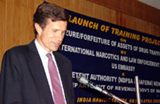Statement of Robert Blake
before the Senate Foreign Relations Committee during confirmation hearings as US ambassador to Sri Lanka, June 15, 2006
|
My challenge, if I am confirmed, will be to work with all legitimate political entities in Sri Lanka towards a durable peace, to show that peace and prosperity for all Sri Lankans are fundamental, interlinked goals. Peace provides the foundation for prosperity, which in turn demonstrates the benefits of peace and builds support for it. To reach these twin goals, the parties must be convinced that peace negotiations are the only way forward, that there can be no military solution to this conflict.
|

Deputy Chief of U.S. Mission Robert O. Blake addressing participants at the launch of a Training Project ... New Delhi, April 12, 2005 |
Mr. Chairman and Members of the Committee, I am honored and pleased to appear before you today to discuss my nomination to be Ambassador to Sri Lanka and Ambassador to Maldives. I wish to thank President Bush and Secretary Rice for the confidence they have shown in me through this nomination. I would like to thank Under Secretary for Political Affairs Nicholas Burns and our Assistant Secretary for South and Central Asian Affairs Richard Boucher for their support. I would also like to especially thank my wife Sofia and my daughters Kalena and Isabella for their love and support.
Mr. Chairman, I have sought throughout my 21-year career in the Foreign Service to acquire a broad range of policy and management experience both in the field and in Washington. I have served in Nigeria, Egypt, Algeria and Tunisia performing economic, consular and political work. In the Department I served as desk officer for Tunisia and later Turkey, as Deputy Executive Secretary, and as Executive Assistant to Under Secretary for Political Affairs Marc Grossman. Most recently I was privileged to serve as Deputy Chief of Mission in India during a period of exceptional progress in our bilateral relations with that important country.
If confirmed, I look forward to working with members of the Committee to further U.S. interests in both Sri Lanka and Maldives. Both countries present challenges and opportunities for the United States.
Sri Lanka today is a country at the crossroads. It survived and continues to recover from the devastating December 2004 tsunami, but cannot seem to overcome a manmade disaster - its 20 year civil war. Recent events, including the collapse of ceasefire implementation talks between the government and Liberation Tigers of Tamil Eelam as well as escalating violence, have again placed the country at the brink of open hostilities. If Sri Lanka can reverse this tragic downward spiral, the future could be bright. Sri Lanka’s human and natural resources and its tradition of stressing public education, health and social services give the country a strong base for economic development.
My challenge, if I am confirmed, will be to work with all legitimate political entities in Sri Lanka towards a durable peace, to show that peace and prosperity for all Sri Lankans are fundamental, interlinked goals. Peace provides the foundation for prosperity, which in turn demonstrates the benefits of peace and builds support for it. To reach these twin goals, the parties must be convinced that peace negotiations are the only way forward, that there can be no military solution to this conflict.
The United States is helping in the search for peace, in particular through our participation with Norway, Japan, and the EU in the so-called Co-Chairs, a four-member group monitoring assistance and the peace process in Sri Lanka. We encourage and welcome the crucial role that has been played by the government of Norway, which facilitated the 2002 ceasefire and the ensuing peace negotiations.
We have made clear where we stand. We support the government of Sri Lanka and that nation’s territorial integrity. But both the government and the Liberation Tigers of Tamil Eelam should take steps to move toward a ceasefire and ultimately a permanent peace. The Tigers were designated a Foreign Terrorist Organization by our government in 1997, a status that remains in effect and richly deserved today. The Tigers must give up terrorism in word and deed before the United States will consider removing them from our foreign terrorist list. Sadly, their terrorist activities continue. We call on the Tigers to give up terrorism and violence, demonstrate respect for human rights, and return to the negotiating table in good faith.
The Sri Lankan government must show it is willing to address legitimate Tamil grievances, including articulating a political vision for the future of the country that provides room for the aspirations of all Sri Lankans, from all religions and ethnicities. It must also crack down on the disturbing increase in violence in government-controlled areas.
The United States Mission in Colombo is also accredited to the Republic of Maldives, a nation of 1,200 coral islands with a total land area about one and one half times that of Washington, DC, and a population similar in size to Arlington, Virginia. Maldives is a moderate Muslim country well-disposed to the United States; it has cooperated closely with us in the war on terror. The 2004 tsunami hit Maldives hard, causing an estimated USD 450 million or 60 percent of Gross Domestic Product in damages. The tourism industry, Maldives’ key economic sector, continues to recover. We have contributed significantly to tsunami recovery efforts. We are encouraging Maldives’ efforts at political reform by moving from an autocratic system to a genuine multi-party democracy that protects and promotes human rights. It will be my job, if I am confirmed, to further strengthen the good relationship we have with Maldives, and support and encourage political reform there.
Mr. Chairman, I appreciate the opportunity to appear before the Committee. I would be happy to answer any questions you might have.
|
 Home
Home Archives
Archives Home
Home Archives
Archives